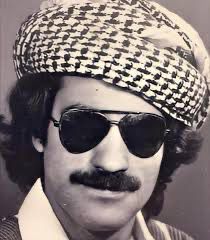Saeed Gabari, born Muhammad Saeed Ismail Suleiman on March 24, 1956, in the village of Khirbe Kazhe near Amuda in Western Kurdistan, is remembered as one of the most influential figures in Kurdish music and folklore. Though he lost his eyesight at the age of eight due to illness, Gabari’s determination and natural musical talent led him to become a powerful voice for Kurdish culture, heritage, and resistance.
Raised in a humble farming family from the Gabari tribe of Sinjar, Gabari began singing traditional Kurdish songs by age five. By the time he was ten, he had gained recognition in Qamishlo, Amuda, and Hasakah for his patriotic and folkloric performances. His musical journey was shaped by early mentorships with Kurdish cultural figures like Hadi Pahlavi, who taught him to sing and play the tanbur, and intellectuals such as Cigerxwîn, Seida Tirej, and Osman Sabri, who influenced his artistic and ideological growth.
In 1969, Gabari recorded his first song, Bulbuli Dilshad (“The Happy Nightingale”), which earned him widespread acclaim. However, his rising popularity and political lyrics drew the attention of the Syrian Ba’ath regime, forcing him into exile in 1978. He settled in Southern Kurdistan (Iraqi Kurdistan), where he collaborated with other Kurdish artists in Hawler and Baghdad, continuing to face threats from political regimes.
In 1981, Gabari joined the Kurdish revolution as a Peshmerga fighter, combining his musical gifts with his commitment to national struggle. During this period, he worked closely with fellow artist Ardawan Zakhoyi, contributing to the revolutionary art movement.
Gabari later moved to Germany in the early 1990s, where he dedicated himself to preserving Kurdish musical heritage. He claimed to have saved over 3,600 traditional songs from extinction and performed more than 4,700 songs and ballads throughout his lifetime. Fluent in Kurdish, Arabic, English, French, and Persian, Gabari was also a family man, survived by his wife and eight children.
Saeed Gabari passed away from lung cancer on May 4, 2020, in Hawler. Honoring his final wish, he was buried in Mala Omar cemetery. His legacy lives on as a symbol of cultural preservation, artistic passion, and unwavering dedication to the Kurdish cause.

